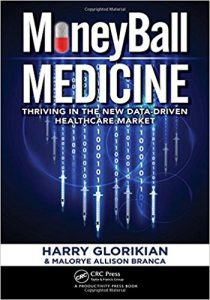MoneyBall Medicine: Thriving in the New Data-Driven Healthcare Market
By Harry Glorikian and Malorye Allison Branca
Productivity Press, New York (Nov. 16, 2017), 272 pp.
ISBN: 978-1138198043, Hardcover. $29.95
Special to the Armenian Weekly

In their latest book MoneyBall Medicine, authors Harry Glorikian and Malorye Allison Branca take you on a journey to better understand the challenges and potential solutions that characterize the present and future of healthcare delivery in the United States. Glorikian, a healthcare professional with a long history in the industry as consultant, investor, and operator, pairs with Branca, a medical science writer who has been reporting on health care topics for more than 15 years, to compile extensive research, interviews, and data-driven information highlighting how a better grasp of technology can help healthcare professionals deliver the best care at an optimized cost to the system and the individual.
The book is built on a solid foundation of interviews with key leaders in the field who provide a window into disruptive technologies that are about to be unleashed onto the field, significantly affecting diagnosis, treatment and interaction among stakeholders in the space of health care delivery.
Glorikian offers excellent examples of startups such as PokitDoc and FDNA as cutting-edge technologies that move forward, and case studies, such as Flatiron, whose founders witnessed family members navigate the difficult cancer clinical trial domain. With no background in healthcare but armed with their previous startup backgrounds, they set out to better understand the challenges and the opportunities facing the stakeholders in the oncology clinical trials domain from physicians, to administrator, nurses and patients. Their goal was to allow communication between different teams conducting clinical trials across the country and optimize the means to find the right trial for the right patient based on actual data.
These are the kind of approaches, Glorikian argues, that need to be fostered and nourished in the system. However, while this is a great example, it is a very niche component in the vast world of healthcare delivery. A systemic approach is needed to help corral these islands of innovation into a fully functioning system that is unencumbered by ridiculous health care policies and the need to do things, simply because they are billable by insurance providers.
One of the most interesting aspects of this work demonstrated the surprisingly low level of technology used in the field, specifically in data sharing. We are overdue for a much more connected and robust approach to healthcare, where silo mentalities go by the wayside and give way to new, integrated approaches that leverage data from a myriad of sources to provide better care and help advance future innovations.

The burden of red tape, entrenched interests, institutional inertias, inability and unwillingness of stakeholders to talk to one another and share info, the incremental and “safe” approach of the NIH towards health care innovation, and the vilification of industry-academic partnerships (not referring to those few bad apples who created cash cows for themselves and in the process disrupted essential cooperation between these two worlds), have led us to our current state.
Glorikian argues that much progress is tempered by the fundamental discussion of whether healthcare is a right or a privilege, and that in the absence of leadership on part of the government and the political elite, it is only natural that the market will lead the way in innovations to optimize care and delivery. Meanwhile, we see politicians use the healthcare debate as a way to score “political points” against one another, the U.S.’s slowness to adopt innovative practices is slowly eating away at its position of world leadership in healthcare and medicine.
Furthermore, the continued assault on funding for biomedical and health care research will have a detrimental effect on recruiting the next generation of scientists and further stifling innovation and creativity of the scientists now, who have to chase the dollar to survive, as opposed to conducting cutting-edge research and take chances and leaps in innovation.
MoneyBall Medicine details the impact of digital medicine and personalized genetics on the delivery of healthcare, which Glorikian believes will affect us at both individual and societal levels in near future. It’s a wonderful book for anyone with anything from a passing interest in the field to healthcare industry thought leaders.



Be the first to comment